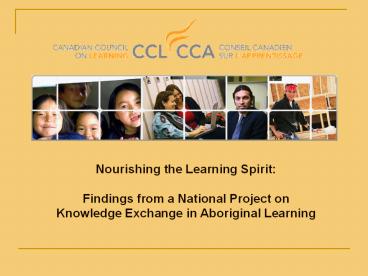Aboriginal Learning Knowledge Centre - PowerPoint PPT Presentation
Title:
Aboriginal Learning Knowledge Centre
Description:
Title: Aboriginal Learning Knowledge Centre Author: Rita Bouvier Last modified by: College of Education Created Date: 7/3/2006 11:21:32 PM Document presentation format – PowerPoint PPT presentation
Number of Views:454
Avg rating:3.0/5.0
Title: Aboriginal Learning Knowledge Centre
1
Nourishing the Learning Spirit Findings from a
National Project on Knowledge Exchange in
Aboriginal Learning
2
(No Transcript)
3
- ABLKC Leadership and Governance
- Co-Managed
- Aboriginal Education Research Centre (AERC),
College of Education, University of Saskatchewan - First Nations Adult and Higher Education
Consortium (FNAHEC) and - Governed
- Steering Committee, from Consortium of First
Nations, Inuit, and Métis scholars, leaders,
educators - National Advisory Committee of informed
researchers and policy makers (both Aboriginal
and non-Aboriginal).
4
Knowledge Exchange and Information SharingBundle
Approach and Priorities
- Review what we know (literature
reviews/scans/surveys/ - inventories of programs/report syntheses/meet
with informed people) - Ask and listen to what people say (dialogues,
roundtables, workshops, conferences, schools,
workplaces, forums,) - Share with others what we heard (webpage, news
bulletins, media, conferences, speakers,
community talks, reports, papers, journals,
On-line Resource Centre) - Identify success (es) and find ways to report
progress and celebrate these with each other and
to the Canadian public (Composite Learning Index,
State of Learning Report, National Recognition
Program, national and regional conferences) - Partner with learning organizations to make
Aboriginal learning more visible, to identify
good community work and publicize promising
practices in learning.
5
Six Animation Theme Bundles Intersecting and
Interdependent
6
Nourishing the Learning Spirit Explores the
capacity and potential we have as human beings
for learning and the impact of culture and how
our location (cultural, social, economic,
political forces) in life affects the capacity to
learn as individuals and groups.
Dr. Marie Battiste, Lead Aboriginal Education
Research Centre College of Education, University
of Sask
7
Aboriginal Perspectives on Learning
- The Aboriginal worldview is holistic we are
Spirit, Heart, Mind and Body. - We are a part of Creation we are not separate
from it. - We all have a purpose for being here, and we have
Gifts from the Creator that are to be used for
fulfilling that purpose. - Everything is/has Spirit/Energy. We need to be
mindful of our feelings, thoughts, words and
actions. What we put out there affects everybody
and everything else.
8
Elders Perspectives of Learning
- Knowledge is held by the spirits, shared by the
spirits and comes from the spiritsOur body then
can be seen as carrier of the learning spirit. - (Elder Danny Musqua, in D. Knight,1998)
- Learning and spirit are foundational to the
ethos of Aboriginal culture and pedagogy.
(Ermine, 1998, 26)
9
What did We Learn?
- Diverse First Nations, Métis, Inuit Peoples,
languages, cultures, traditions, and beliefs - Common strands of shared understanding
- Place informs knowledge, knowing, and learning
- We can all learn from each other regardless
of diverse origins
10
What is the Learning Spirit?
- Personal and collective energy that influences
our being, acting, living together - Present from conception through life
- Characterized by combination of learning
strengths, gifts, capacities, choices.and life
consequences - Supported through interrelationships with
relations, culture, language, tradition,
community, natural world
11
Learning is In Relation
- Experiential, holistic, life-long, spiritual
- With Mother Earth
- With Ourselves Care for Self
- mind, body, spirit
- With Collective Community
12
Lifelong Learning Opportunities
- Choices (will/desire)
- Positive energy activates more positive energy
- Negative energy draws more negative energy
- Conditions that create consequences
(natural-floods/drought) - (Social Cultural Economic Political
Strategic-poverty/colonization/racism/politics)
13
Learning Spirit Reveals
- Before birth (Mother/father/Elders dreams)
- Birth/Naming ceremony
- Dreaming/visioning/in-spiration
- Talents and Gifts emerge
- Self-inner Talk
- Finding Purpose in Convictions
- Propensities to service, teaching, occupations,
etc. - Life path and choices
14
Identified Learning Blocks
- Loss of spiritual connection
- Disconnections with others/natural world
- Forced assimilation (residential/public
schools) - Trauma
- Anger
- Negative energy in others (low expectations,
prejudices, pathologizing, some pedagogy etc.)
15
Processes for reconnecting
- Nourishing spirit, mind, body to reveal gifts
- Visiting Elders and the Land (Protocols for
seeking/committing to learning Tobacco, cloth,
gifts, etc) - Attentive listening/uninterrupted spaces
- Inviting spirit (back) into lives
- Reconnecting to the collective (language,
ceremony and traditions, history) - Caring for others
- Sharing learning and learning lessons
16
- Aboriginal Learning Knowledge Centre
- Directors Dr. Vivian Ayoungman (FNAHEC) and Dr.
Marie Battiste (AERC) - Rita Bouvier, ABLKC Coordinator
- AERC, College of Education,
- University of Saskatchewan
- Room 1212, 28 Campus Drive
- Saskatoon, SK S7N 0X1
- Ph 306-966-1362 Fax 306-966-1363
- Genevieve Fox, ABLKC Coordinator
- First Nations Adult Higher Education Consortium
(FNAHEC) - 132 - 16 Avenue NE Calgary, AB T2E 1J7
- Ph 403-230-0072 Fax 403-212-1401
- Maria Wilson, Coordinator
- c/o Inuit Tapiriit Kanatami (ITK) 170 Laurier
Ave. W, Suite 510 - Ottawa, ON K1P 5V5 Ph (613) 238-8181 ext.
267 Fax (613) 234-1991































